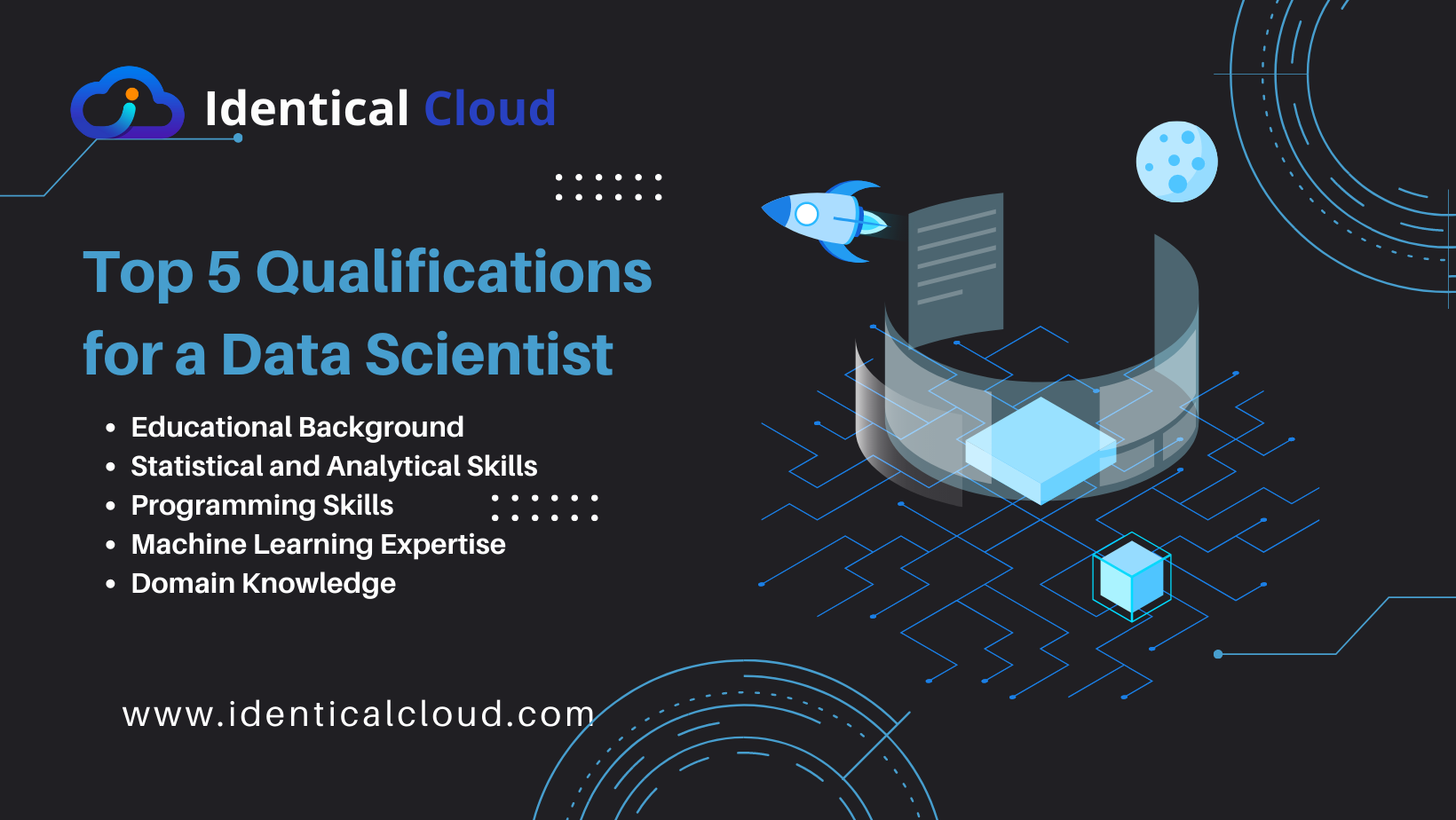
Top 5 Qualifications for a Data Scientist
Top 5 Qualifications for a Data Scientist
In today’s data-driven world, the role of a data scientist has become increasingly crucial across industries. Data scientists are the modern-day detectives, extracting valuable insights from vast amounts of data to drive informed decision-making. To embark on a successful journey as a data scientist, certain qualifications are essential.
Qualifications for a data scientist can vary based on the specific role, industry, and company.
In this blog, we’ll delve into the top five qualifications that pave the way for a thriving data scientist career.
- Educational Foundation: Mastering the Science
The first cornerstone of a data scientist’s qualifications is a solid educational background. Most data scientists hold at least a master’s degree, and many possess a PhD, in fields such as Computer Science, Statistics, Mathematics, or Engineering. These disciplines equip aspiring data scientists with a strong analytical foundation, essential for dissecting complex datasets.
A comprehensive education instills the theoretical knowledge required for statistical analysis, hypothesis testing, and machine learning algorithms. A data scientist’s ability to choose the right techniques and methods hinges on this educational foundation.
- Statistical and Analytical Acumen: Deciphering the Numbers
At the heart of data science lies the art of understanding numbers. Possessing a profound grasp of statistics and data analysis is the second key qualification. A data scientist should be at ease with concepts like regression, classification, clustering, and more.
This statistical prowess empowers data scientists to uncover meaningful patterns, validate hypotheses, and generate predictions. Proficiency in utilizing statistical software, such as Python or R, alongside libraries like NumPy, Pandas, and scikit-learn, is indispensable for effective data analysis.
- Programming Proficiency: Crafting Data Magic
Coding skills are the data scientist’s magic wand. Proficiency in programming languages like Python and R is essential for manipulating, cleaning, and preprocessing large datasets. These languages serve as a gateway to constructing powerful machine learning models that turn data into actionable insights.
The ability to code facilitates the customization of algorithms, enabling data scientists to tailor solutions to unique problems. Familiarity with SQL is also important for effective database querying and management.
- Machine Learning Mastery: Predicting the Future
As the name suggests, machine learning is a cornerstone of data science. A data scientist should possess a comprehensive understanding of machine learning techniques, spanning from supervised and unsupervised learning to deep learning.
The ability to select, train, and evaluate models is crucial for generating accurate predictions and recommendations. Proficiency in popular machine learning libraries like TensorFlow, PyTorch, and scikit-learn allows data scientists to transform raw data into predictive gold.
- Domain Knowledge: Contextualizing the Data
While technical qualifications are vital, domain knowledge provides the context necessary to unlock the true potential of data. Understanding the industry or field in which data is being analyzed is essential for framing relevant questions and deriving meaningful insights.
A data scientist’s domain knowledge guides the exploration of data, ensuring that the right variables are considered and potential biases are identified. This contextual understanding helps in presenting actionable recommendations to stakeholders.
Additional qualifications and skills that can enhance a data scientist’s profile include:
- Big Data Technologies: Familiarity with tools and technologies for handling big data, such as Hadoop, Spark, and distributed computing frameworks, can be advantageous.
- Data Visualization: Proficiency in creating compelling and informative data visualizations using tools like Matplotlib, Seaborn, Tableau, or Power BI can enhance your ability to communicate insights effectively.
- Communication Skills: Data scientists need to communicate their findings and insights to both technical and non-technical stakeholders. Strong written and verbal communication skills are essential for presenting complex results in a clear and understandable manner.
- Problem-Solving Abilities: Data scientists often tackle complex and ambiguous problems. Strong problem-solving skills, creativity, and the ability to approach challenges from different angles are highly valuable.
Remember that while qualifications are important, practical experience through projects, internships, and real-world applications of data science concepts can play a significant role in building a successful data science career.
What are top 3 skills for data scientist?
The top 3 skills for data scientists are:
- Strong foundation in mathematics and statistics: Data scientists need to be able to understand and apply statistical concepts to data analysis. They also need to be able to use mathematical models to predict future outcomes or make decisions.
- Programming skills: Data scientists need to be able to code in order to automate tasks, build data pipelines, and develop machine learning models. The most popular programming languages for data science are Python, R, and SQL.
- Data visualization skills: Data scientists need to be able to communicate their findings to others in a clear and concise way. Data visualization is a powerful tool for communicating data insights, and data scientists need to be proficient in using data visualization tools like Tableau, Matplotlib, and Seaborn.
If you have these skills, you have a good chance of becoming a successful data scientist.
In the rapidly evolving landscape of data science, acquiring the top qualifications is the compass that guides aspiring data scientists towards success. A strong educational foundation, statistical acumen, programming proficiency, machine learning mastery, and domain knowledge collectively shape a well-rounded and competent data scientist.
The journey to becoming a data scientist is an exciting and challenging one. With dedication and the right qualifications, individuals can step into the role of a modern data magician, turning raw data into insights that drive innovation, efficiency, and informed decision-making across industries.
